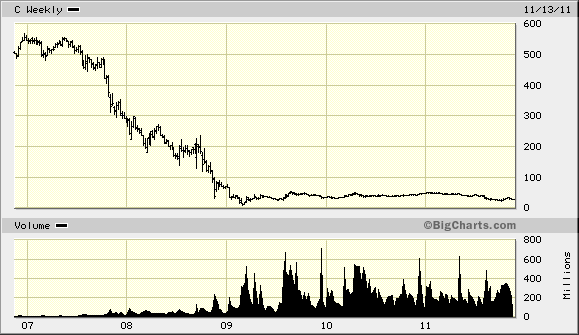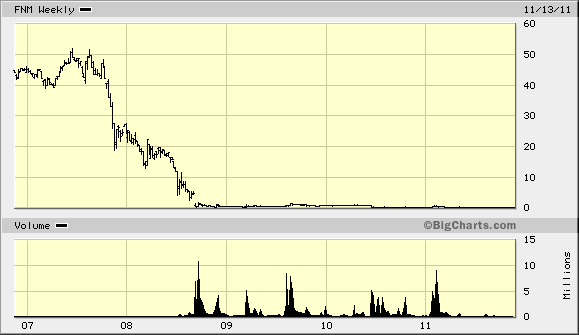“If it weren’t for bad luck, I’d have no luck at all.” –Stevie Ray Vaughan
Ok, so my mother never loved me. I reveled in schadenfreude as I watched the big money go down in flames buying financial fiascos during 2008/09. My twisted ego might be comforted but what can we learn for the future? Try to think through what makes financial stocks difficult to value and especially risky in a credit crisis. We will discuss under the heading, lesson, near the end of this post.
Richard Pzena, called one of the smartest men on Wall Street, nearly sank his money management firm (PZN) by buying FRE, FNM and Citigroup (“C”) in early 2008. See prior post: http://csinvesting.org/2011/11/15/pzena-pzn-disappointment-despair-and-tax-loss-selling/
Below is an inteview in early 2008 with Richard Pzena. Mr. Pzena gives his reasons for owning Freddie Mac (FRE), Fannie Mae (FNM) and Citigroup (C)
http://articles.moneycentral.msn.com/Investing/SuperModels/HowTheSmartMoneyGotItWrong.aspx
A Citi revival?
Earlier this week, I talked with Richard Pzena, one of the deans of the value camp. His company, Pzena Investment Management (PZN, news, msgs),
which I mentioned last week as a buy on big dips, runs $25.5 billion in value
money for clients worldwide, including that once-sterling John Hancock fund
that’s now in the tank. He was defiant, contending that he expects to double
his money on such road kill as Citigroup, Fannie Mae, and Freddie Mac over the next three years. I think he’s dreaming, but he does manage $25.49 billion more than I do, so perhaps you should lend him an ear.
Pzena’s main point is that though losses in subprime mortgages have generated the most headlines in the sector, few banks actually have much exposure to them. He sees Citigroup, for instance, as a global consumer-credit business that generates most of its money by issuing plastic overseas. The way he sees it, virtually every adult has a credit card while few have subprime loans, so what’s the problem?

To be sure, Citigroup has had monumental write-downs on its mortgage portfolios and gotten stuck with illiquid structured investment vehicles on its books, and credit card defaults will lead to more losses. But before too much longer new management will have taken out the garbage, and the remainder of the company will have a chance to shine again.
“We view it as a great global franchise that’s inefficiently priced,” Pzena says. “We don’t think the real value of the firm has come down at all, even though it’s
lost over $125 billion in market cap.”
Pzena says he doesn’t know how long he will have to wait to be right — and if he did know, the stock wouldn’t be cheap. His analyst team has torn the company’s financials apart, stress-tested them to the most outrageous negative cases and sees its business getting back on track in every scenario. (Editor: I doubt even Citigroup’s CFO knew what financial risks the bank’s derviatives traders were taking much less the traders.)
The US dollar could turn out to be the big comeback surprise of the year. One reason: As foreign investors put big money into US companies, those foreign countries are less likely to dump the dollar, MSN Money’s Jim Jubak says.
“The reason it’s so depressed is that no one really knows how bad it will be, but we think that sometime in 2008 there will be clarity and we’ll start to see buyers come back,” he says. “They might have to cut their dividend — which would
not be so terrible — to shore up their capital base, but they’re not going out
of business. They will weather this storm.”
The manager says his analysts have put their money where their spreadsheets are — buying more Fannie, Freddie and Citi for their personal accounts than at any time in the past five years. “They believe they have properly analyzed these franchises and should buy even though they don’t know when the turn is
coming,” Pzena says. “There’s no dissension about this position within the firm. Buying low is a strategy that has never failed to work.”
No competition left for Fannie and Freddie

Catching falling knives is a strategy that has never failed to leave your hand in shreds, either. But Pzena insists he has history on his side. Financial stocks got
extremely cheap in the year before the past five recessions, he says, then
began to outperform the market about three months after the recessions’
official start dates, as determined later by the National Bureau of Economic
Research.
If the current recession began in the fourth quarter, as many independent experts believe, then it could be time for Citi, Fannie and Freddie to start bucking up. The idea is that when people fear the unknown, they sell. But in the reverso-world logic of Wall Street, once a recession becomes evident, investors begin anticipating a recovery.
—
Editor of Csinvesting: I hope you caught the flaw in Pzena’s thinking. Buying “low” is a false premise. A plunging price does not equal value though it may be a place to look for it.
Another famous investor, Jim Rogers, saw Pzena’s picks as over-leveraged death traps. http://articles.moneycentral.msn.com/Investing/SuperModels/StockMarketWinterIsMovingIn.aspx?page=1
Rogers, who is equally negative on stocks, was one of the earliest proponents of investing in China and in metals, long before their surge of the past few years. He achieved notoriety three years ago by warning that shares of Fannie Mae would get crushed once the market realized that it was “unbelievably over-leveraged” and would sink under the weight of its out-of-control derivatives positions. At the time, the government-sponsored mortgage-lending titan was on top of its game, and his warning drew derision. But no one’s mocking him now that Fannie shares have lost 60% of their value.
“There was clearly outright fraud, as they were reporting earnings for years when they really had no idea whether they were making money — they were just making stuff up,” he says. “People are still in denial about Fannie Mae’s value. They took every phony mortgage loan ever made by banks, losing billions, and now the government wants them to take on even more bad loans to bail people out? They should just let it go bankrupt!”
Rogers, who is short Fannie Mae shares, is also short Citigroup (C, news, msgs)
and highly negative on its prospects, too.
“Technically, it’s bankrupt, with gigantic off-balance-sheet derivatives positions whose value it cannot possibly know,” he says. Though he believes some large
banks can and will go under in the next year or two under the weight of
billions of dollars worth of bad loans and blown-up derivatives positions, he
doubts the government will allow Citi or Fannie to fail. “They’ll nationalize them in some way. It’s wrong, but they can’t let the two largest lenders in the nation go down.”
The fund manager, who has traveled extensively in emerging markets and lives part of the year in Asia, says sovereign wealth funds in Abu Dhabi and Singapore that recently made large investments in Citigroup and UBS AG are likely to lose a lot of money on their ploys. “They’re making a big mistake; these banks have many more problems still ahead. They should wait until these companies are really on the ropes a few years from now . . . and trading at $5 a share.”
But aren’t they supposed to be the smart money? Maybe not. “I know these people, and they have never given me the impression that they’re smarter than anyone else,” Rogers says. “They have gigantic amounts of money, but they’ve made a bad judgment in these cases.”
US economic problems contagious
As for the rest of the market, well, Rogers doesn’t see equities to buy right now, as he forecasts that a U.S. recession — already in progress, in his view — will choke off earnings growth at companies worldwide. He calls the emerging markets “overexploited” and likes only a few commodities, such as farm goods
and energy.
“The number of acres devoted to wheat farming is at a 30-year low while inventories of food worldwide are at their lowest since 1972,” Rogers says. “With so much corn going into our tanks as ethanol, a growing middle class worldwide eating more corn-fed meat and wearing more cotton than ever, agriculture has a great future, if you ask me, and that’s why I’m buying.”
Editor: Jim Rogers has an understanding of Austrian Business Cycle Theory. http://jimrogersblog.com/
Lesson
An economic model will characterize a company, any company, except financial groups, with three endogenous and two exogenous variables: an amount of invested capital, a real growth rate and a real cash return associated with this capital, complemented by the cost of capital and a market price. Linking these endogenous variables with the two exogenous ones is what we call ‘investment analysis’.
Now you see the problem with analyzing financial companies. What IS their invested capital? How do you define economic capital for banks, insurance companies and mutual fund companies? Financial groups carry large amounts of what we could call ‘third party capital’–in other words, capital that does not belong to shareholders, and is not provided by lenders. These are the assets deposited by the clients of these companies; bank deposits, for instance. Due to the complexity of these groups, accurately desegregating only the capital financing the company’s own assets is nearly impossible, especially since most of these assets are ‘marked to market’, or revalued every day at their market value.
A large international bank like Citigroup may have thousands of derivatives contracts making the true economic picture of its balance sheet impossible to determine. Furthermore, there is an analytical issue. Segregating capital and identifying cash flow for financial groups is difficult because, fundamentally, these businesses do not produce profits in the same way as non-financial groups. The latter simply add some value, via a proprietary process, to a certain amount of operating costs, and sell units (goods and services) of the total cost to its clients.
The former capture capital flows, often thanks to financial leverage partly from debt, partly from ‘third-party capital’, transform them and clip a remuneration for this process. Even if it were possible to identify cash flows and economic capital for financial groups, the difference in balance sheet leverage would demand the calculation of an expected return (cost of capital) specific to them.
Financial firms are inherently more difficult to value and certainly subject to financing risk. Perhaps avoiding financial firms might be one strategy for improving returns. Please be aware of the unique investment risks financial firms contain and allow for them in your valuations and portfolio management. Richard Pzena’s clients suffered permanent loss of capital as shown by the two charts above.
Thoughts?



